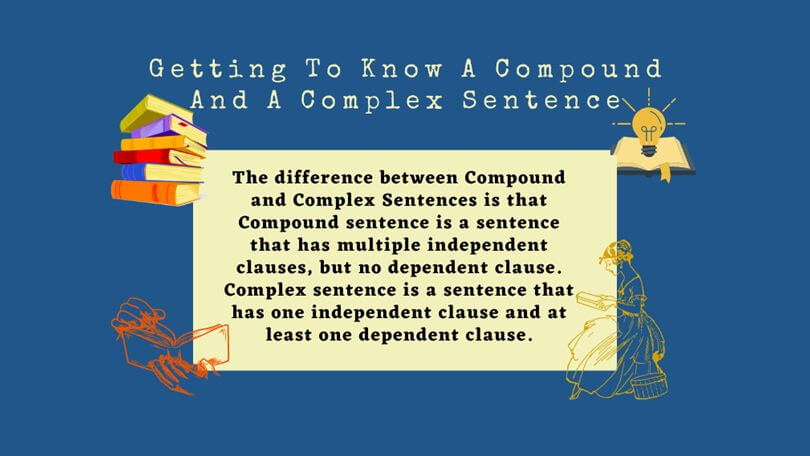Sentences play a vital role in our daily lives since they allow us to share our views with others. The term “sentence” refers to a group of words that includes a verb and a subject. It asks a question, makes a statement, and so on. Sentences are helpful for making any communication interesting and understandable in the second person.
Simple sentences, compound sentences, complex sentences, and compound-complex sentences are the different types of sentences. They’re all different in a lot of ways, and that may affect the entire discourse. Some of them are simple, while others are a little more difficult. Compound and complex sentences are two examples of sentences that are a little bit perplexing.
Compound Sentence Vs. Complex Sentence
The major distinction between compound and complex sentences is that compound sentences do not contain a dependent clause and instead consist of many independent clauses. Complex sentences, on the other hand, have more than one or only one dependent clause and an independent clause. Coordinating conjunctions such for, yet, or, so, and others are used in compound sentences. In complex sentences, subordinating conjunctions are utilized.
A compound sentence is a sentence that is made up of two or more separate clauses. In connecting clauses, the coordinating conjunction is very significant. Conjunctions such as for, yet, or, so, and, nor, and but are used more frequently. “Last night, I yelled at my parents, and I’m feeling bad now,” is an example of a compound sentence.
The complicated sentence is made up of an independent clause with one or more independent clauses. When building complex sentences, subordinating conjunctions such as because, although, how, once, though, and so on are utilized. In connecting clauses, subordinating conjunctions are crucial. A complex sentence would be something like, “If you don’t come to my party today, I’ll never speak to you again.”
What are Compound Sentences?
Sentences with two or more separate clauses are referred to as compound sentences. An independent clause is a sentence that does not rely on anything else and hence has a complete meaning. “We sleep” is an example of an independent sentence, in which “we” is the subject and “sleep” is the verb.
The comma is used to connect complicated statements. Coordinating conjunctions connect phrases, words, and independent clauses in these types of sentences. The use of “fanboys” or for, and, nor, but, or, yet, so makes coordinating conjunctions easier to remember.
The semicolon can also be used instead of a coordinating conjunction or a comma to create a compound sentence. They describe two full thoughts that are linked to any concept. The following format can be used to create a countdown compound sentence: independent clause1 + Coordinating conjunction + independent clause2.
What are Complex Sentences?
Complex sentences are those that have multiple dependent clauses or have one independent clause with multiple dependent clauses. A dependent clause is a sentence that is reliant on another clause and cannot stand alone. At the start of the dependent clause, subordinating conjunctions are utilized. “Unless Ron apologizes to me,” for example, is an example of a dependent clause.
Subordinating conjunctions are used to complete complex statements. Subordinating conjunctions are words that link an independent and dependent sentence together. Because, however, how, once, though, until, where, while, and many others are examples of subordinating conjunctions.
Because they differ from simple sentences, complicated sentences are called “complex”. While resembling compound sentences in certain ways. A conditional sentence is the most common sort of conditional sentence. The format for crafting a complex sentence is “independent close + dependent clause”.
Difference Between Compound Sentences and Complex Sentence
- Look for conjunctions like and, nor, yet, or, but, etc. to identify a compound sentence. To detect complex phrases, check for subordinating conjunctions such as although, because, since, whenever, before, and many others.
- In compound sentences, a coordinating conjunction is required to join two clauses together. In complex phrases, however, a subordinating conjunction is needed to join two clauses together.
- There is also a difference in the amount of clauses (independent and dependent). There must be at least two independent clauses in compound sentences, although a dependent clause is not essential. In a complex sentence, only one independent clause with at least one dependent clause is utilized.
- A coordinating conjunction is not utilized to begin a compound sentence. Subordinating conjunctions, on the other hand, are most needed towards the start of a complex sentence.
- Compound sentences aren’t substantially clearer in terms of sentence clarity and detail. As a result, compound sentences are inferior to complicated ones in terms of effectiveness.
Conclusion
As a result, it can be inferred that while compound and complex phrases appear to be the same, they are not. It’s a little difficult to tell whether the above sentence is complex or compound. The word that unites sentences is known as the “key to difference” since it is the conjunction that makes all the difference.
It’s a good idea to memorize seven-word coordinating conjunctions, sometimes known as “fanboys.” Learning subordinating conjunctions will be pointless and a waste of time. Because the distinction between compound and complex sentences will be easier to discern. Multiple separate clauses make up compound sentences. Complex sentences, on the other hand, consist of an independent clause plus one or more dependent clauses.

